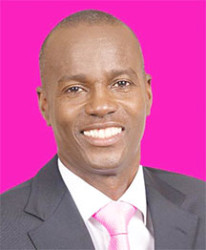PORT-AU-PRINCE, (Reuters) – Haiti called off tomorrow’s presidential election after violent protests erupted yesterday and the opposition candidate vowed to boycott the vote over alleged fraud.

Pierre Louis Opont, president of Haiti’s electoral council, said the runoff vote was being pushed back for security reasons. He did not say when the election, which the U.S. government is helping to fund, would be rescheduled.
The announcement first sparked jubilation among the demonstrators on the streets of the capital Port-au-Prince, but the mood quickly darkened. Gunshots were fired as protesters clashed with police.
The postponement is nevertheless expected to ease unrest after days of protests in the deeply impoverished country of about 10 million people, at pains to rebuild from a devastating earthquake six years ago and to emerge from decades of political dysfunction.
Opposition candidate Jude Celestin said last week he would not take part in the election, alleging a first round vote in October was rigged to favor the ruling party candidate.
Hamstrung with weak institutions, Haiti has struggled to build a stable democracy since the overthrow of the 1957-1986 dictatorship of the Duvalier family and ensuing military coups and election fraud.
Protesters have burnt vehicles and windows in recent days in Port-au-Prince. On Friday, police fired at a group of people who were attacking a man who appeared to have fired shots at them. The man lay on the ground bleeding profusely, but it was unclear how he was injured.
Protesters set fire to at least one car. Burning tires peppered the streets with one billowing black smoke directly below a giant poster of ruling party candidate Jovenel Moise. Another group stabbed a poster of Moise with a metal pole.
“The direction (outgoing President Michel) Martelly has taken the country is no good,” said Rolando Joilcoeui, a community worker standing among thousands of people in the streets.
“We’ve said ‘no’ to that regime. The election was a fraud.”
Swiss-trained engineer Celestin has said the government has not done enough to remedy cheating in the first round, and called the plans for the second round vote “a farce.”
Celestin was second in a field of 54 candidates in the October election. He came in almost eight percentage points behind Moise, a banana-exporter and political newcomer running on a platform to modernize agriculture and better manage water in the flood and drought-prone nation.
After the postponement, members of Moise’s campaign team were grim-faced as they gathered at a city hotel. Asked what happens next, one said: “That’s the million dollar question.”
Pressure for postponement had been building over the week.




